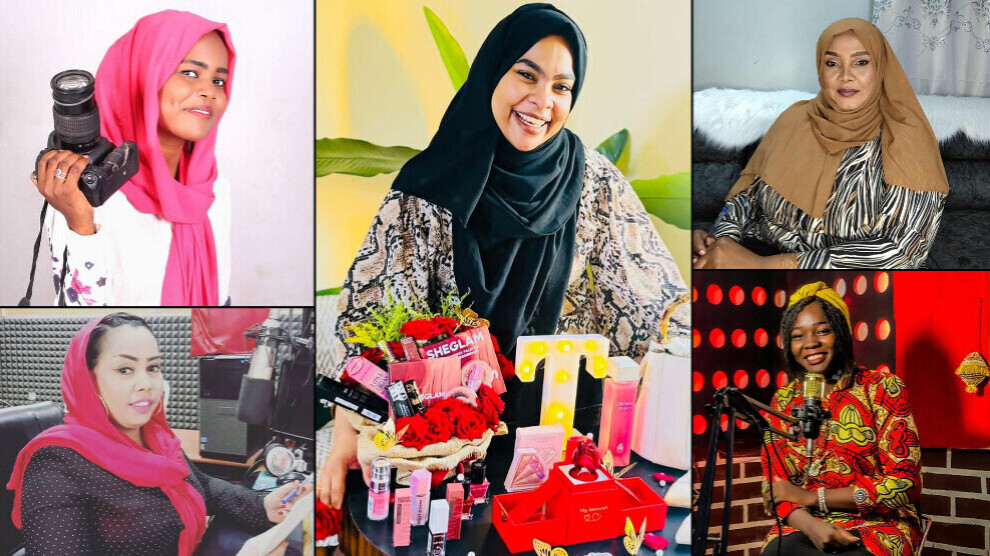Sudanese Female Journalists Turn to Alternative Professions to Make Ends Meet
The ongoing conflict between the Sudanese army and the RSF, now approaching its second year, has forced many Sudanese women journalists to seek alternative means of livelihood amid harsh and deteriorating conditions.

Mervat Abdel Qader
Sudan — The ongoing conflict between the Sudanese army and the Rapid Support Forces (RSF), now approaching its second year, has forced many Sudanese women journalists to seek alternative means of livelihood amid harsh and deteriorating conditions.
With media institutions destroyed or targeted, and access to information restricted, many women in journalism have lost their jobs and their ability to work safely. Torn between their passion for journalism and the urgent need to survive, numerous Sudanese female reporters have chosen to step away from their profession—some temporarily, others indefinitely—to take on new roles either inside Sudan or in the countries where they have sought refuge.
Arrests and Threats
Many journalists—men and women alike—have faced accusations from both sides of the conflict, accused alternately of treason or collaboration. Several were detained, threatened with death, or had their families targeted. Female journalists, in particular, have endured arrests by the RSF for allegedly cooperating with the army, and by the army for supposedly working with the RSF.
At the onset of the conflict, a large number of state television and radio employees, including many women, were detained for days as airstrikes and shelling struck media buildings. They were eventually released after international pressure from humanitarian and media organizations.
Amid the chaos, female journalists became especially vulnerable to violence, harassment, and intimidation—often risking their lives simply to report the truth.
Photojournalist En’am Ahmaday recounted how her camera and equipment were confiscated at an RSF checkpoint in Darfur as she tried to travel east. She was detained and accused of filming RSF positions for the army, with threats made against her and her family. When she later entered an area controlled by the army, she was again detained—this time by military intelligence, accused of aiding the RSF.
After repeated harassment, she abandoned journalism altogether and began working in a small soap factory to provide for her family. Yet, she insists, “I’ll return to the media once life returns to normal and freedom is restored.”
Simple and Handcrafted Work as the Only Option
Many women turned to small crafts and manual labor to make ends meet.
Walaa Ibrahim, a presenter at Al-Balad TV, said her channel’s offices were completely destroyed and looted, forcing her to shift to selling roasted peanuts, snacks, and coffee to sustain herself and her family.
“The biggest challenge,” she explained, “is that prices keep rising while people’s income remains very low. I just hope that one day, media institutions in Khartoum will reopen so we can all return to our real work.”
Traditional Jewelry Making
TV presenter Zohl Salah also lost her job when her media outlet was bombed, killing several colleagues. She fled to Al-Jazira State in central Sudan to continue reporting, but with new restrictions requiring military permits to work, journalism became impossible.
She was forced to move again, eventually finding stability by crafting traditional jewelry—a skill she later taught to other women as a source of income during these difficult times.
“The alternative profession doesn’t erase my passion for journalism,” she said. “I’ll go back to it when our institutions and freedoms return.”
Migration for Safety and New Beginnings
Thousands of Sudanese families have fled to neighboring countries, seeking both safety and work opportunities. Among them were many female journalists who chose exile and hardship over danger and unemployment at home.
Tasabih Hamed, a broadcaster from Nyala Radio and TV in western Sudan, recounted how her home and workplace were bombed and looted.
“We stayed as long as we could to inform people, but it became impossible. We were constantly targeted, and there was no water, electricity, gas, internet—or even safety. Eventually, we had to leave Sudan.”
After moving through several regions, she finally settled in Kampala, Uganda, where she began baking pastries and bread. “It was a new and difficult journey,” she said, “but I succeeded in my new work.”
Tasabih now works alongside other displaced Sudanese women—many of them former doctors, engineers, and professionals—who have all taken up manual trades to survive. “These experiences taught me resilience,” she reflected. “No matter how many times life stops you, you can always start again.”
Gift Design and Decoration
Journalist and TV host Fatima Taha also fled Sudan, settling in Egypt after losing her job. She now works in designing and decorating gifts to make a living.
“The war in Sudan is unlike others,” she explained. “Here, journalists are not protected—they’re treated as enemies by both sides. So, I chose to leave and start fresh. My gift design project has grown, and I’m proud of what I’ve built.”
Despite the hardships, Sudanese female journalists remain determined to continue telling the truth whenever circumstances allow—hoping that one day, both sides of the conflict will respect international laws that protect journalists and guarantee their right to work freely and safely.
